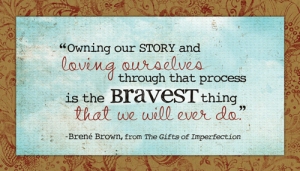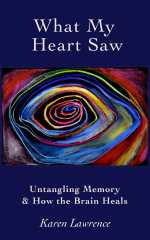How we can cultivate the courage, compassion, and connection to go to bed at night thinking, ‘Yes, I am sometimes afraid, but I am also brave. And, yes, I am imperfect, but that doesn’t change the truth that I am enough, and worthy of love. I am enough! What a concept! Would I rather think I am enough than think I am damaged goods? You bet. Would you rather feel worthy and loveable? I am sure. What stops us from feeling whole, brave and accepting all of who we are? What will help us to realize that we are not damaged, or that there are no mistakes? What are the tools we have or can create to change those beliefs?
This message of being damaged goods is pervasive and insidious. It can also be a self-fulfilling prophecy. We may say to ourselves, “I think I am damaged therefore I act like I am damaged. And if I act like I am damaged then I don’t have to act out of self-respect let alone self-esteem.” Thinking we are damaged may be at the root of casual violence, drug use, or any form of self abuse. The thought that we are damaged is wholly based in shame. When we create awareness of how we carry shame in our lives we take our first steps towards freedom. I am, and hopefully you are, ready to change that message.
Do we carry shame like some kind of emotional genetic code? Does our parents shame becomes our shame? Maybe it doesn’t look exactly the same. My mother was ashamed of her immigrant mother, my father was ashamed of his hillbilly father. My shame comes out in second guessing and berating myself for apparent mistakes. Are we carrying shame around as if it is the sweetest smelling nosegay when actually it is a “hot mess” as the teens are saying these days?
Awareness of these messages of shame is the first step. Maybe the second is the realization that shame is carried forward through our families. My mother was ashamed so therefore she shamed me. If I can let her off the proverbial hook, then maybe I can do the same for myself. And only THEN we can create a tool that addresses these beliefs at the unconscious level. To simply notice something may or may not change it…however, when we interrupt the negative pattern and consciously reprogram the unconscious change is more likely to occur.
Most of us ‘try’ to change our idea of being damaged goods at the level of willpower. As in “I won’t think that way anymore…I will not think that way anymore…I will not think…oh shoot! I am back there again.” If we are still doing the same thing, can we continue to be surprised when we get the same results?
I had a conversation with a mentor the other day. We were talking about the pattern I still have after all these years of therapy and recovery of being upset by little things that did not go as planned. I used to call them mistakes and grind them into me like a broken record. She and I were talking on the porch of a grocery store, and just inside the door was a large sign that said, “Thank you!” And I realized that I could say thank you, when I have turned left instead of right. Thank you when I did not have the answer to a clients question. By saying thank you I am acknowledging that there might have been a reason for the left turn, or for saying “I don’t know”. I can be grateful that each time these alleged mistakes happened they provided me with a chance to do something different. The first time I said thank you rather than berating myself the feeling of freedom and internal space was sublime.
You may already know that you are not damaged. You may already realize that you are worthy and loveable. What do you do to change your beliefs around shame, being damaged or making mistakes? What do you do to claim that you are indeed “Enough”?




Pingback: Intergenerational Aspects of Shame – The Legacy of the Greatest Generation | Winston Scrooge
Thank you for writing your blog. Any man who writes about shame from the standpoint of how he healed is a hero in my book.